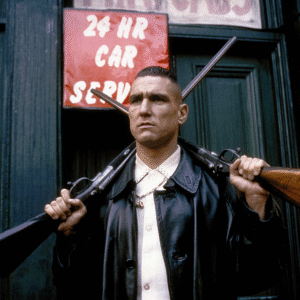16-year-old Sofia explores the many and varied reasons that footballers give up the game

Ex-footballer Vinnie Jones in the film ‘Lock, Stock and Two Smoking Barrels’ (1998).
Picture by: AJ Pics | Alamy
Article link copied.
September 12, 2025
Five of the most bizarre football retirements you’ve never heard of

Football is a pretty unpredictable game, but some stories do tend to follow a certain script. A young, talented player emerges, and everyone immediately starts calling them ‘the next big thing’. The media attention, the massive contracts, the pressure to perform week in and week out – it’s a lot to ask. And for some, it proves too much. They reach the pinnacle of their careers and decide to walk away for reasons that have nothing to do with injuries or a loss of form.
Here are five of the most unforgettable retirement stories in the history of the game. Players who chose to give up football, driven by everything from spiritual awakenings to a desire for a ‘normal’ life.
Harbingers’ Weekly Brief
The rock star
Most players would kill for a career like that of Pablo Daniel Osvaldo. The Argentinian was one talented striker, who played for top European clubs including Roma and Juventus, even representing the Italian national team. So when he retired in 2016 at the age of 30, it raised more than a few eyebrows. Why would a player in his prime walk away from the money and the fame? The answer, it turns out, was music.
Osvaldo’s final professional stint was actually at Boca Juniors in Buenos Aires, his boyhood club. His time there, however, was a disaster. He was kicked out after he was caught smoking in the dressing room following a match.
After this incident, he announced his retirement, turning down offers from multiple clubs in order to pursue his true passion. He formed a band called Barrio Viejo, explaining that he was tired of the rules and lack of freedom that came with being a professional footballer. In his own words, he preferred “asado [barbecue] and a beer to money”.
He did return to football in January 2020, joining the Argentinian club Banfield, but retired for a second time six months later and hasn’t returned to professional football since. However, he did play for Huracan’s over-35s in April, even scoring a goal in his first game.
The Hollywood actor
British footballer Vinnie Jones was a character long before he became a Hollywood actor. He was a key member of Wimbledon’s notorious ‘Crazy Gang’ in the 1980s and ’90s, known for his aggressive style and ‘hard man’ persona. He was more likely to get a red card than a goal and was often in the newspapers for his on-field behaviour.
After a respectable career playing for clubs such as Chelsea and Wimbledon, Jones found a different way to showcase his tough-guy image: Hollywood.
He was quickly cast in Guy Ritchie’s 1999 cult crime-comedy Lock, Stock and Two Smoking Barrels. This role led to a successful acting career, with Jones soon appearing in blockbuster films such as Snatch and Gone in 60 Seconds.
Since then, he has continued to act, featuring in Netflix’s The Gentlemen in 2024.
The pro-wrestler
Tim Wiese was a goalkeeper who spent the prime of his career at Werder Bremen and earned six caps for the German national team. After a quiet end to his football career in 2014, Wiese’s retirement took a truly unexpected turn.
He decided to begin training to become a professional wrestler with the WWE. He made his debut in 2016, with a new physique that was almost unrecognisable: he added 40 kilos of muscle!
The better life searcher
Once hailed as the next David Beckham, David Bentley played for top clubs including Arsenal and Tottenham as well as England’s national team. However, the winger simply became disillusioned with the game he used to love and retired aged just 29 in 2014.
Bentley saidhe was unhappy with the “robotic” and commercialised nature of modern football. He felt the game had lost its spontaneity and he was tired of the constant scrutiny from social media and the press. He made the decision to walk away and find a more authentic life, which included running a bar and restaurant group in Spain.
The man who feared the apocalypse
You think you’ve heard it all, and then there’s Carlos Roa. The guy was a world-class goalkeeper, a key player for his club, RCD Mallorca, and a hero for his country, Argentina, after his heroics in the 1998 World Cup – where he saved a crucial penalty, knocking England out of the tournament.
Nonetheless, at just 30 years old, he decided to call it quits. Why? Because he was convinced the world was going to end.
Roa was a devout Seventh-day Adventist and was so certain the apocalypse was coming on New Year’s Day 2000 that he sold his possessions and moved to an isolated retreat in Argentina with his family, to prepare for the end of days and become one with God. When the new millennium arrived and the world was still spinning, Roa’s doomsday conviction was shattered and he returned to football later the same year.
Written by:

Culture Section Editor 2025
Vergel, Spain
Born in 2009 in Kyiv, Sofia moved to a town in Spain close to Valencia in 2020. With her ability to quickly learn languages, she adjusted to her new life seamlessly.
Sofia is an aspiring sports broadcast journalist. She’s passionate about a wide range of subjects including culture, cinema and global affairs.
She joined Harbingers’ Magazine in the summer of 2023, and since then, she began to consistently explore the intersections of culture, creativity, and society. This, along with Sofia’s exceptional writing skills, led to her promotion as the Culture Section Editor at Harbingers’ Magazine in March 2025. Simultaneously, she serves as the Afghanistan Newsroom Editor.
In her free time, Sofia stays busy doing fitness, traveling to new places, and writing short stories.
Sofia speaks Ukrainian, Spanish, English, and Russian.
Edited by:

🌍 Join the World's Youngest Newsroom—Create a Free Account
Sign up to save your favourite articles, get personalised recommendations, and stay informed about stories that Gen Z worldwide actually care about. Plus, subscribe to our newsletter for the latest stories delivered straight to your inbox. 📲
© 2025 The Oxford School for the Future of Journalism


